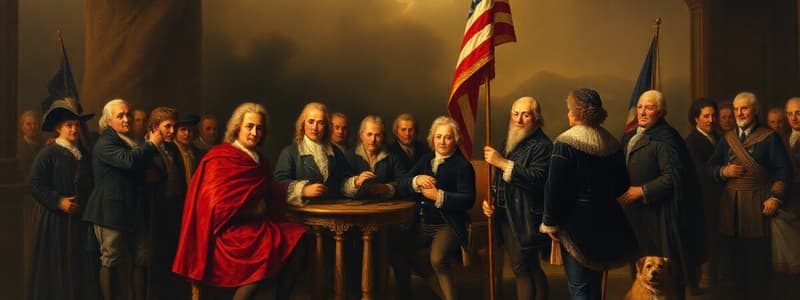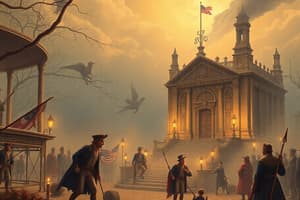Podcast
Questions and Answers
Many enslavers transported their enslaved people inland, away from the coastal temptation to join the British ______.
Many enslavers transported their enslaved people inland, away from the coastal temptation to join the British ______.
armies
On May 10, 1776, Congress called on all colonies to establish revolutionary ______.
On May 10, 1776, Congress called on all colonies to establish revolutionary ______.
governments
Richard Henry Lee's resolution was the official legal declaration of ______.
Richard Henry Lee's resolution was the official legal declaration of ______.
independence
The famous preamble of the Declaration of Independence refers to ______ law.
The famous preamble of the Declaration of Independence refers to ______ law.
Signup and view all the answers
Delegates from South Carolina and Georgia opposed language blaming the British for the ______ trade.
Delegates from South Carolina and Georgia opposed language blaming the British for the ______ trade.
Signup and view all the answers
The grievances listed in the Declaration outlined colonists' issues with British attempts to reform ______ administration.
The grievances listed in the Declaration outlined colonists' issues with British attempts to reform ______ administration.
Signup and view all the answers
The war began at ______ and Concord, marking the start of armed conflict between the colonies and Britain.
The war began at ______ and Concord, marking the start of armed conflict between the colonies and Britain.
Signup and view all the answers
The Congress approved the Declaration of Independence on ______ 4, 1776.
The Congress approved the Declaration of Independence on ______ 4, 1776.
Signup and view all the answers
The _________ Massacre sparked significant colonial resistance against British rule.
The _________ Massacre sparked significant colonial resistance against British rule.
Signup and view all the answers
Paul Revere circulated an engraving that depicted British soldiers as ________.
Paul Revere circulated an engraving that depicted British soldiers as ________.
Signup and view all the answers
Crispus Attucks was a formerly enslaved man who became a free ________ and one of the victims of the Boston Massacre.
Crispus Attucks was a formerly enslaved man who became a free ________ and one of the victims of the Boston Massacre.
Signup and view all the answers
The repeal of all new duties except the one on tea was an example of Britain's attempt to save ________.
The repeal of all new duties except the one on tea was an example of Britain's attempt to save ________.
Signup and view all the answers
The character of colonial resistance changed, becoming more ________ and coordinated between 1765 and 1770.
The character of colonial resistance changed, becoming more ________ and coordinated between 1765 and 1770.
Signup and view all the answers
The _________ Act left a lasting impact on the colonial economy despite widespread boycotts.
The _________ Act left a lasting impact on the colonial economy despite widespread boycotts.
Signup and view all the answers
The development of a shared American political identity was influenced by a growing sense of ________ grievances among colonists.
The development of a shared American political identity was influenced by a growing sense of ________ grievances among colonists.
Signup and view all the answers
The actions of the Sons of Liberty were vital in organizing ________ against British taxation.
The actions of the Sons of Liberty were vital in organizing ________ against British taxation.
Signup and view all the answers
The ______ were a group that actively opposed British taxation and policies.
The ______ were a group that actively opposed British taxation and policies.
Signup and view all the answers
Overall, the American Revolution contributed to the emergence of a new ______ identity.
Overall, the American Revolution contributed to the emergence of a new ______ identity.
Signup and view all the answers
The impact of the ______ Act significantly affected colonial economy by leading to boycotts and protests.
The impact of the ______ Act significantly affected colonial economy by leading to boycotts and protests.
Signup and view all the answers
The ______ of Independence formally declared the colonies' break from British rule.
The ______ of Independence formally declared the colonies' break from British rule.
Signup and view all the answers
Political and social ______ emerged among the colonists as a result of differing views on British policies.
Political and social ______ emerged among the colonists as a result of differing views on British policies.
Signup and view all the answers
Colonial resistance was fueled by various ______ causes that arose due to British taxation and control.
Colonial resistance was fueled by various ______ causes that arose due to British taxation and control.
Signup and view all the answers
Ideological foundations of independence included ideas of ______ and natural rights.
Ideological foundations of independence included ideas of ______ and natural rights.
Signup and view all the answers
By the 1760s, the colonists felt a strong emotional attachment to the British ______.
By the 1760s, the colonists felt a strong emotional attachment to the British ______.
Signup and view all the answers
Study Notes
The American Revolution's Origins
- Enslavers transported enslaved people inland to prevent them from joining British armies, often separating families.
- In 1776, the Continental Congress urged colonies to establish revolutionary governments and draft constitutions, marking a significant step toward independence.
- On July 2nd, 1776, Richard Henry Lee introduced a resolution declaring independence from Britain, which was passed by 12 out of 13 colonies. New York abstained due to a threat of British invasion.
- The Declaration of Independence, drafted by Thomas Jefferson with contributions from John Adams and Benjamin Franklin, articulated grievances against British imperial policies, including attempts to reform imperial administration in the 1760s and 1770s.
- The Declaration of Independence was approved on July 4th, 1776.
The American Revolution's Paradox
- The American Revolution was a complex and contradictory event. While fought in the name of liberty, it allowed slavery to continue.
- Resistance to centralized authority led to the formation of new, unified governments, which, in turn, encouraged both public good and personal gain.
- The Revolution was initiated by "founding fathers," but ultimately involved ordinary colonists who significantly shaped the outcome. This popular involvement paved the way for the development of the new American nation.
The Boston Massacre
- In 1768, Britain sent troops to Boston to enforce new policies and quell resistance.
- On March 5th, 1770, a clash between British soldiers and a Boston crowd resulted in the deaths of five civilians, including Crispus Attucks, a formerly enslaved man.
- The Boston Massacre ignited widespread anger towards Britain and fueled colonial unity.
The Stamp Act and Townshend Acts
- Colonial resistance during the Stamp Act of 1765 involved primarily elite figures and popular, sometimes violent, mobs.
- The resistance against the Townshend Acts of 1767 was more coordinated and inclusive, with diverse groups participating in boycotts and non-importation movements.
The Building Blocks of Independence
- Britain's failed attempts to impose imperial reforms in the 1760s led to an increasingly resistant and unified colonial population.
- This period fostered shared grievances and contributed to a growing sense of American political identity.
### Colonial Economic Improvements
- Tensions between the colonies and England eased for a time after the Boston Massacre.
- The colonial economy improved as the postwar recession subsided.
Studying That Suits You
Use AI to generate personalized quizzes and flashcards to suit your learning preferences.
Related Documents
Description
Explore the key events leading to the American Revolution, including the Declaration of Independence and the complexities of liberty versus enslavement. Understand how the Continental Congress played a crucial role in shaping the path to independence amid contradictions. Gain insights into the pivotal moments that defined this revolutionary period.



